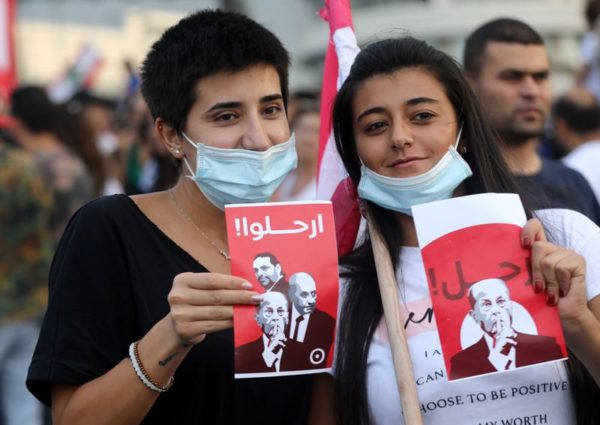
Lebanon’s President Michel Aoun said on Monday that protests gripping the country showed “people’s pain” but that accusing all politicians of corruption equally was not fair.
Aoun added that the government must at least start by lifting banking secrecy from current and future ministers, his office said in a tweet.
“What is happening in the streets expresses people’s pain, but generalizing corruption (charges) against everyone carries big injustice,” he said during a cabinet session.
His comments came as Lebanon’s cabinet is expected to approve reforms including halving ministers’ wages on Monday in a bid to ease an economic crisis and defuse protests that have been the biggest show of dissent against the ruling elite in decades.
Will reforms appease protesters?
Protesters blocked roads for a fifth day of demonstrations fuelled by the crippling economic conditions and anger at perceived corruption of the political elite that has led Lebanon into the crisis.
Officials told Reuters on Sunday that Prime Minister Saad Hariri had agreed a package of reforms with his government partners to tackle the crisis that has driven hundreds of thousands of protesters into the streets.
In central Beirut, scene of the largest protest, people prepared for another day of demonstrations.
“If we get reforms, for a start it’s good, to calm down the storms, people are angry … but on the long term, I don’t know if it will make a change,” said Rida Jammoul, football coach, who was helping to clean-up in Beirut.
Another protester, Ziad Abou Chakra, said he would continue to protest until the government was toppled.
“We will stay here and we won’t open the roads whatever happens,” he said, manning a road block in the Zouk Mikhael area north of Beriut.
What does the reform plan offer?
The reform plan includes a 50% cut in salaries of current and former presidents, ministers and lawmakers, as well as reductions in benefits for state institutions and officials.
It also includes the central bank and private banks contributing $3.3 billion to achieve a “near zero deficit” for the 2020 budget.
The government also aims to privatise the telecommunications sector and overhaul the costly and crumbling electricity sector, one of the biggest strains on Lebanon’s depleted finances.
Hariri, who leads a coalition cabinet mired in sectarian and political rivalries, gave his feuding government a 72-hour deadline on Friday to agree reforms to ward off crisis, hinting he might otherwise resign. The deadline expires on Monday.
Calls mount for government to resign
A chorus of voices, from union leaders to politicians, has joined calls for Hariri’s government to resign.
The protests have spread across the country since Thursday.
Banks were closed on Monday and the main labour union went on strike, threatening further paralysis.
“The message to the politicians is don’t ever underestimate the power of the people because once they unite they will explode – peacefully,” said Hiba Dandachli, 36, a social entrepreneur who was helping to organise the clean-up.
“There are children, families, all from different religions and backgrounds,” she said.
“If the politicians learn from this they will learn how to lead the country much better.”
“Thieves”
Yesterday hundreds of thousands thronged public squares in the capital and across Lebanon in the largest protests the country has seen since 2005, unifying an often divided public in revolt against traditional leaders who have ruled for three decades and brought the economy to the brink of disaster.
The target was clear: Lebanon’s sectarian-based and elite-dominated political system, which has mostly kept the peace since the 1975-1990 civil war but has also spawned political paralysis and endemic corruption. In Lebanon the president is a Maronite Christian, the parliament speaker a Shiite while the prime minister is a Sunni. Cabinet and parliament seats are equally divided between Christians and Muslims.
For the first time, protesters openly took aim at powerful sectarian leaders from their own communities, turning against warlords previously regarded as untouchable and challenging them in their own strongholds. The warlords have long guaranteed loyalty by styling themselves as their sect’s protectors and passing out patronage to its members.
“They (politicians) have been stealing from the people for 30 years. They stole and stole and stole and they still don’t have enough,” said Claire Abu Rached, protesting with her two sons, aged 10 and 8, north of Beirut.
“Thieves, thieves, thieves” the protesters in Beirut and elsewhere chanted, naming almost every senior Lebanese politician, cursing them or demanding they step down.
“People cannot take it anymore,” said Nader Fares, a protester in central Beirut who said he’s unemployed. “There are no good schools, no electricity and no water.”
AGENCIES

Leave a Reply
You must be logged in to post a comment.